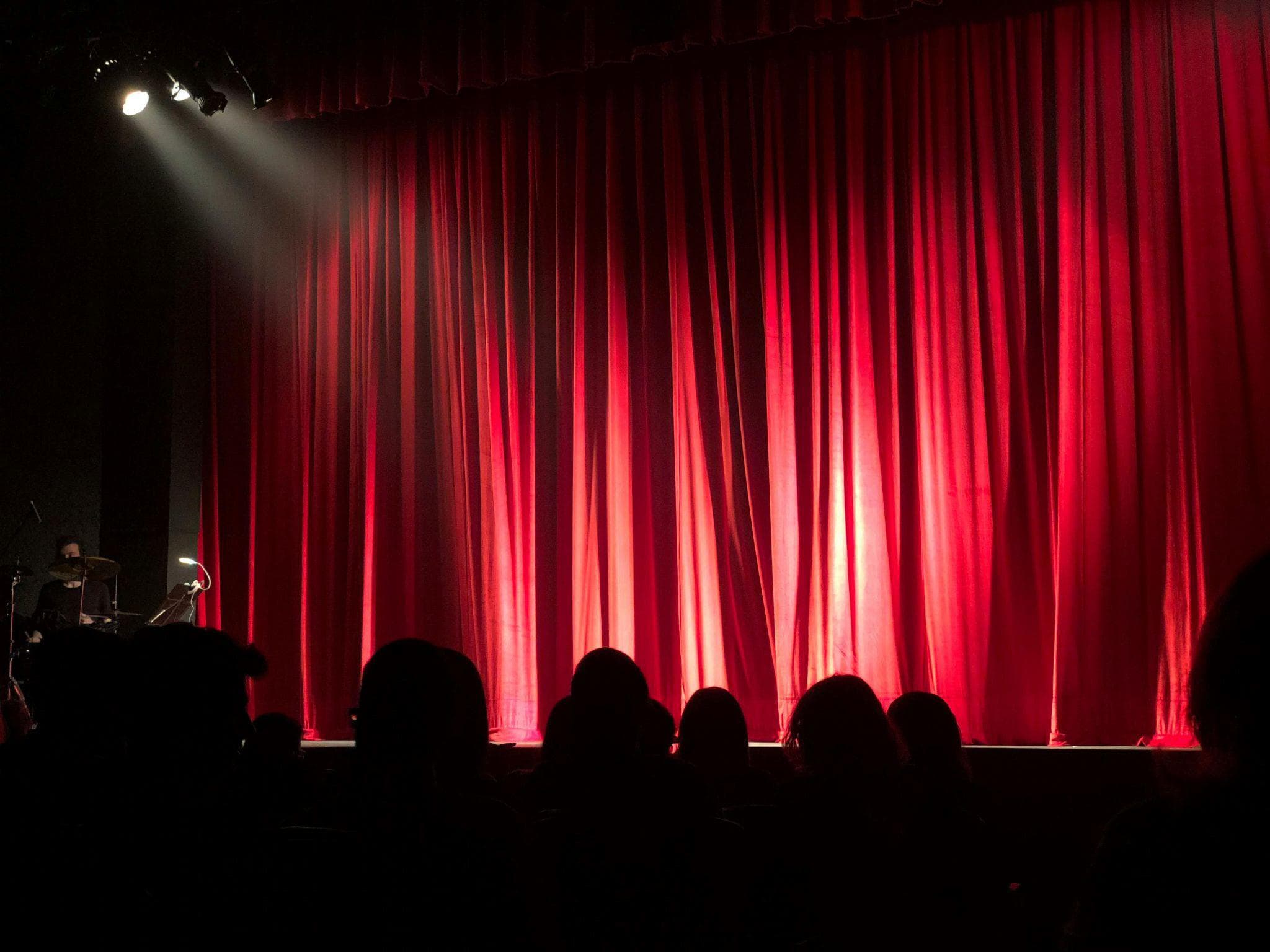
Have you ever found yourself laughing at something you probably shouldn’t? Welcome to the audacious world of dark comedy, a genre that fearlessly dives into the abyss of human experience and somehow, against all odds, emerges with a punchline. It’s about taking the truly unthinkable—topics like death, crime, war, illness, or profound social anxieties—and twisting them into something that evokes uncomfortable giggles, outright guffaws, or a knowing, rueful smile. This isn’t comedy for the faint of heart; it’s a testament to our collective ability to cope with life’s darkest absurdities by finding humor in the most unexpected corners. These films don’t shy away from the gritty realities; instead, they shine a darkly humorous spotlight on them, inviting us to confront uncomfortable truths through the lens of laughter. It’s a fascinating tightrope walk, often controversial but undeniably powerful. Get ready because we’re about to explore the brilliant, frequently audacious films that blend humor with the most serious or taboo subjects.
What Exactly is Dark Comedy?
So, what precisely defines dark comedy, and how does it differ from just, well, regular comedy? At its core, dark comedy—often referred to as black comedy—is a subgenre that employs humor to confront profound, disturbing, or taboo subjects. Think of it as humor with an edge, a sharp wit that isn’t afraid to cut through polite conventions. Unlike conventional comedy, which typically avoids or treats sensitive topics lightly to ensure universal comfort, dark comedy deliberately engages with them, using wit, irony, and satire as its primary tools. It’s not about making light of suffering, not really. Instead, it’s about using humor as a coping mechanism, a potent form of social commentary, or to highlight the inherent absurdity of life’s more macabre and uncomfortable elements. The humor often arises from jarring juxtaposition: the mundane against the horrific, the polite against the perverse, the innocent against the depraved. Its purpose isn’t always to evoke simple, feel-good joy but sometimes to make us think, squirm in our seats, or even question our reactions and biases. It challenges audiences to find amusement in places they might not expect, often leading to a more complex, lingering, and ultimately more memorable kind of laughter. It’s a laugh that sticks with you, prompting reflection long after the credits roll.
The Fine Line: Navigating Humor in Taboo Topics
Dark comedy operates on a razor-thin edge, a precarious balance between genuine humor and a potential offense that few genres dare to tread. It’s an art form that intentionally pushes boundaries, constantly daring to find levity in subjects often deemed sacred, too painful, or simply off-limits for laughter. Have you ever paused and thought: how do you even begin to make a joke about death, the horrors of war, the complexities of mental illness, or the chilling banality of evil without appearing callous or deeply insensitive? This is precisely where the unparalleled skill of dark comedy truly shines. It demands extraordinary precision, immense nuance, and a profound, almost empathetic understanding of the human condition and our collective anxieties. The humor, when done right, isn’t meant to mock the victims or trivialize their suffering; it isn’t. Instead, it aims to explore the inherent absurdity, the crushing hypocrisy, or the sheer helplessness often associated with these deeply taboo topics. When done right, it can be incredibly cathartic, offering audiences a new and usually unexpected perspective that helps them process difficult emotions. When it misses the mark, however, and let’s be honest, sometimes it does, it can feel cheap, exploitative, deeply offensive, and utterly tone-deaf. It’s a high-wire act with no safety net, with the potential for both brilliant social commentary and awkward, uncomfortable silence.
Why Do We Laugh? The Psychology Behind Dark Humor
Why on earth do we find humor in the grim and the grotesque? It’s a question that often crosses our minds when we chuckle at something seemingly inappropriate. The psychology behind dark humor is surprisingly complex, usually revealing more about ourselves than the joke itself. One leading theory suggests it acts as a powerful coping mechanism, a psychological shield. It’s a way for our minds to process the overwhelming anxiety, profound fear, and deep discomfort that naturally arise when confronting complicated subjects. By actively laughing at the unthinkable, we momentarily gain a sense of control over it, effectively deflating its immense power and making it feel less threatening. This is often described as a form of cognitive reframing, allowing us to perceive a serious, potentially terrifying situation through a less threatening, more absurd lens. Another perspective views dark humor as an act of subversion—a quiet or not-so-quiet rebellion against societal norms and expectations regarding how we “should” react to tragedy or taboo subjects. It’s a way of breaking free from prescribed emotional responses. It can also serve as a vital relief valve, releasing the immense tension built up by confronting uncomfortable realities and helping us discharge pent-up emotions. Ultimately, our unique ability to find humor in the face of darkness often reflects our inherent resilience, our intellectual sophistication, and a surprisingly nuanced understanding of life’s inherent paradoxes. It’s a uniquely human trait to seek and find light, even in the deepest, most shadowed corners.
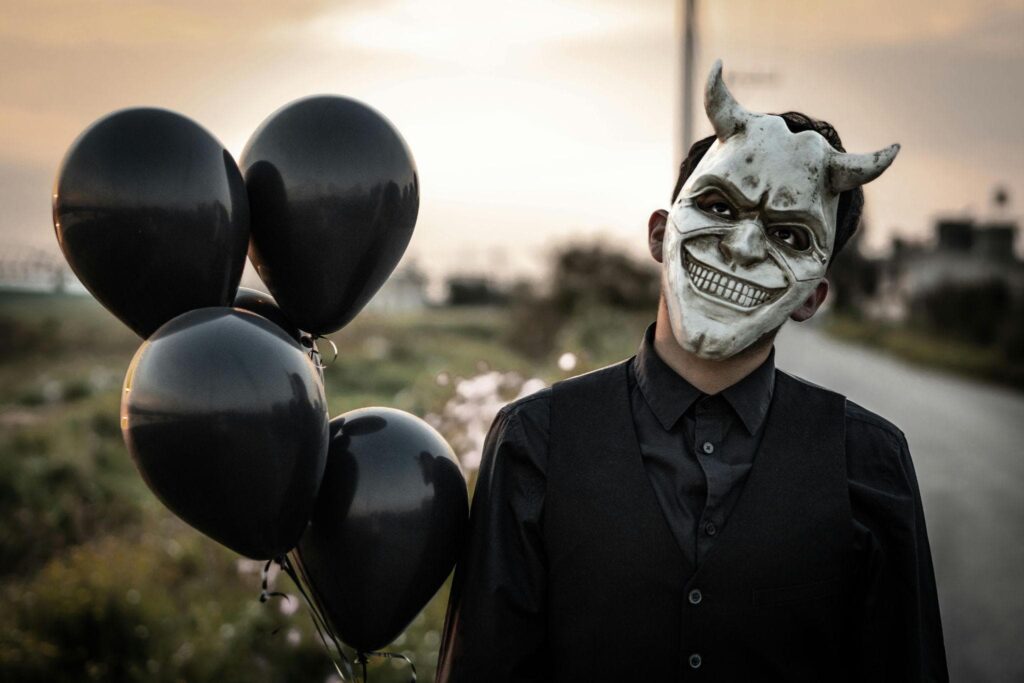
Masters of the Morbid Mirth: Iconic Directors and Their Style
The landscape of dark comedy has been profoundly shaped by visionary directors who possess a truly unique knack for seamlessly blending the grim with the grin. When you ponder this audacious genre, who immediately springs to mind? For many, it’s undeniably the Coen Brothers, whose sprawling filmography is practically a masterclass in bleak humor, from the mundane horrors and darkly comedic twists of Fargo to the existential dread and hilarious misunderstandings of Burn After Reading. Their signature style often involves hapless characters caught in spirals of their own making, punctuated by unexpected violence and sharp, deadpan dialogue. Then there’s the legendary Stanley Kubrick, whose groundbreaking Dr. Strangelove remains the undisputed gold standard for satirizing the terrifying concept of nuclear annihilation. His cold, calculating wit perfectly complements the dire subject matter. Quentin Tarantino, with his distinctive blend of stylized ultra-violence, pop culture references, and razor-sharp, witty dialogue in films like Pulp Fiction, carved out his indelible niche. His characters speak with an almost philosophical casualness, even as mayhem erupts around them. Beyond these titans, directors like Hal Ashby (Harold and Maude), who brought a tender, quirky sensibility to death and romance, Danny Boyle (Trainspotting), who infused drug addiction with a kinetic, darkly comic energy, and even Edgar Wright (Shaun of the Dead), who brilliantly satirized zombie horror with heartfelt humor, have contributed immensely to the genre. Each brings their distinct directorial flair and thematic preoccupations to the challenging yet rewarding art of laughing at life’s darker side. These filmmakers aren’t merely telling jokes; they’re dissecting society, human nature, and our deepest fears with a surgical precision that’s always wrapped, unexpectedly, in a comedic bow.
Films That Dared to Be Dark: Our Essential List
Now, for the main event! After careful consideration and numerous uncomfortable chuckles (yes, it’s a requirement of the job!), we’ve compiled our definitive list of films that truly embody dark comedy done right. These aren’t just movies with a few grim jokes sprinkled in for effect; they are genuine cinematic experiences that bravely plunge headfirst into serious or profoundly taboo subjects, emerging triumphantly with humor that is both shocking and, perhaps surprisingly, deeply insightful. Each film on this curated list offers a unique and memorable take on finding laughter in the very last place you’d ever expect, pushing boundaries and challenging perceptions. They force us to confront uncomfortable realities through a veil of absurdity, making us question why we’re laughing. Get ready to explore narratives that might make you squirm uncomfortably one moment and then burst into genuine, unrestrained laughter the next, proving, time and again, that sometimes, the darkest humor sheds the brightest light on human folly.
1. Dr. Strangelove (1964): Nuclear War Never Looked So Funny
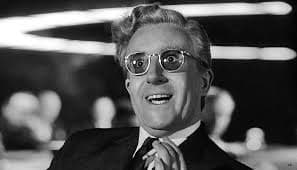
Stanley Kubrick’s Dr. Strangelove, or How I Learned to Stop Worrying and Love the Bomb, is an absolute masterpiece of dark comedy, tackling the most unthinkable subject imaginable: nuclear annihilation. Can you even imagine trying to make a comedy out of global destruction? Kubrick not only imagined it, he perfected it. In this chillingly brilliant Cold War satire, a rogue American general launches an unauthorized nuclear attack on the Soviet Union, leading to a desperate, absurd scramble to prevent irreversible global catastrophe. The humor stems from the sheer, mind-boggling incompetence and bizarre, almost cartoonish, characters inhabiting the highest levels of power. From Peter Sellers’ multi-role brilliance (including the titular Dr. Strangelove, with his rogue arm) to George C. Scott’s manic, jingoistic General Turgidson, every performance adds layers to the absurdity. It’s a chillingly funny, prescient look at how easily humanity could destroy itself, exposing the utter absurdity of military logic and political maneuvering when faced with the ultimate, unthinkable outcome.
2. Fargo (1996): Midwest Macabre with a Smile
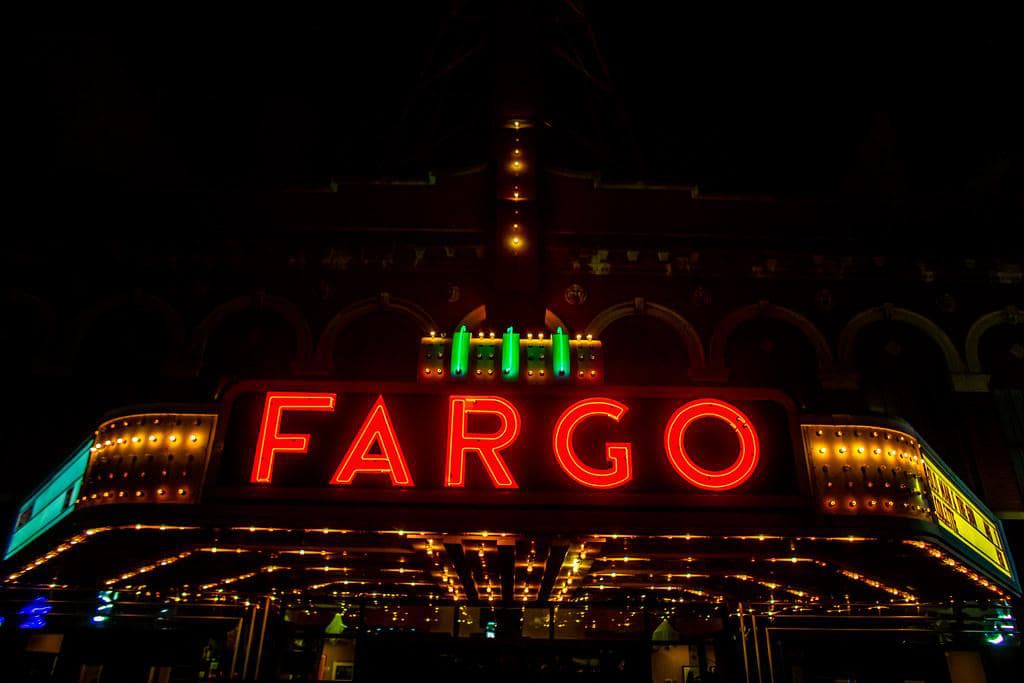
The Coen Brothers’ Fargo is a prime, often imitated example of dark comedy, masterfully blending a chilling crime narrative with a distinctive brand of awkward, almost polite, Midwestern humor. Set against the bleak, snow-covered landscapes of Minnesota and North Dakota, the film follows Jerry Lundegaard, a desperate car salesman who orchestrates the kidnapping of his wife to extort money from his wealthy father-in-law. What begins as a seemingly simple, if ill-conceived, scheme quickly spirals into a brutal, bloody mess of murder and incompetence, all punctuated by bizarre, yet strangely compelling, characters and darkly comedic dialogue. The humor stems from the sheer ineptitude of the criminals, the quirky and almost painfully polite interactions with residents, and the unflappable, heavily pregnant police chief, Marge Gunderson (Frances McDormand), who navigates the escalating horrors with a calm, sensible, and utterly charming demeanor. It’s a masterful study of human folly, where violence and banality coexist in unsettlingly hilarious ways, painting a portrait of quiet desperation leading to outright chaos.
3. Pulp Fiction (1994): Crime, Chaos, and Clever Quips
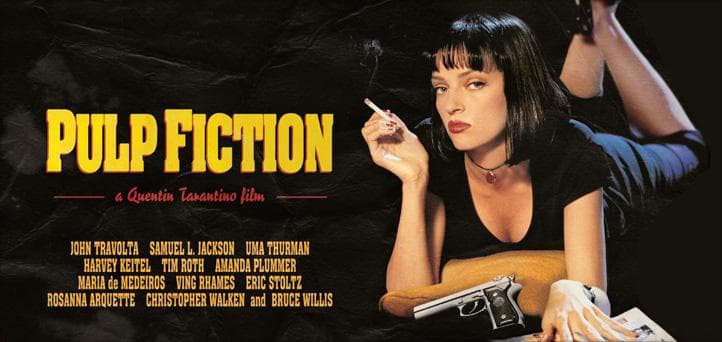
Quentin Tarantino’s Pulp Fiction isn’t just a landmark in filmmaking that redefined a generation; it’s a quintessential dark comedy that revels in its morally ambiguous characters, sudden bursts of extreme, stylized violence, and incredibly witty, non-linear dialogue. The film brilliantly weaves together several interconnected storylines involving hitmen, gangsters, a boxer, and a diner stick-up, all infused with a unique brand of extraordinary, casual brutality. The dark humor arises from the sheer unexpectedness of the situations (who can forget the “cleaner” scene after an accidental head explosion?), the mundane, often philosophical conversations juxtaposed directly with horrific acts, and the charismatic, iconic performances of its ensemble cast. It constantly challenges viewers to find humor in ethically dubious situations, making us feel almost complicit in the uncomfortable laughter that ensues. Pulp Fiction didn’t just redefine cool; it proved that even the darkest, most dangerous corners of the criminal underworld can be ripe for painful, yet utterly unforgettable, laughs, largely thanks to its sharp writing and brilliant timing.
4. American Psycho (2000): The Horrors of High Society
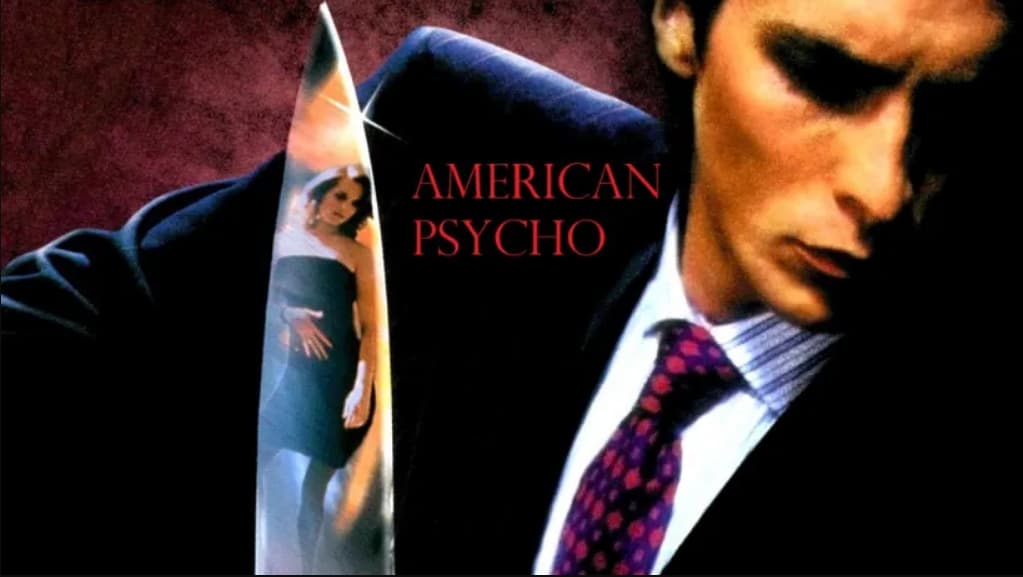
American Psycho is a chilling yet undeniably incisive dark comedy that plunges headfirst into the depraved mind of Patrick Bateman (Christian Bale), a narcissistic 1980s New York investment banker who secretly leads a horrifying double life as a serial killer. The film brilliantly and brutally satirizes the soulless materialism, rampant consumerism, and profound superficiality of corporate culture, particularly during the era of Wall Street excess. Here, discussions about designer labels, exclusive restaurant reservations, and the perfect business card are often debated with more passion and intensity than the grisly murders themselves. The dark humor stems from the sheer absurdity of Bateman’s inner monologue, his meticulously obsessive routines, and the stark contrast between his outwardly perfect, almost indistinguishable persona and his horrific inner world. It’s a disturbing, yet often hilariously incisive, critique of unchecked consumerism and toxic masculinity, making us laugh uncomfortably at the extremity of his vanity and the almost unbelievable lack of awareness from those immediately around him. Christian Bale’s utterly committed performance makes Bateman simultaneously terrifying, pathetic, and strangely comical.
5. Harold and Maude (1971): Love, Life, and a Little Bit of Death
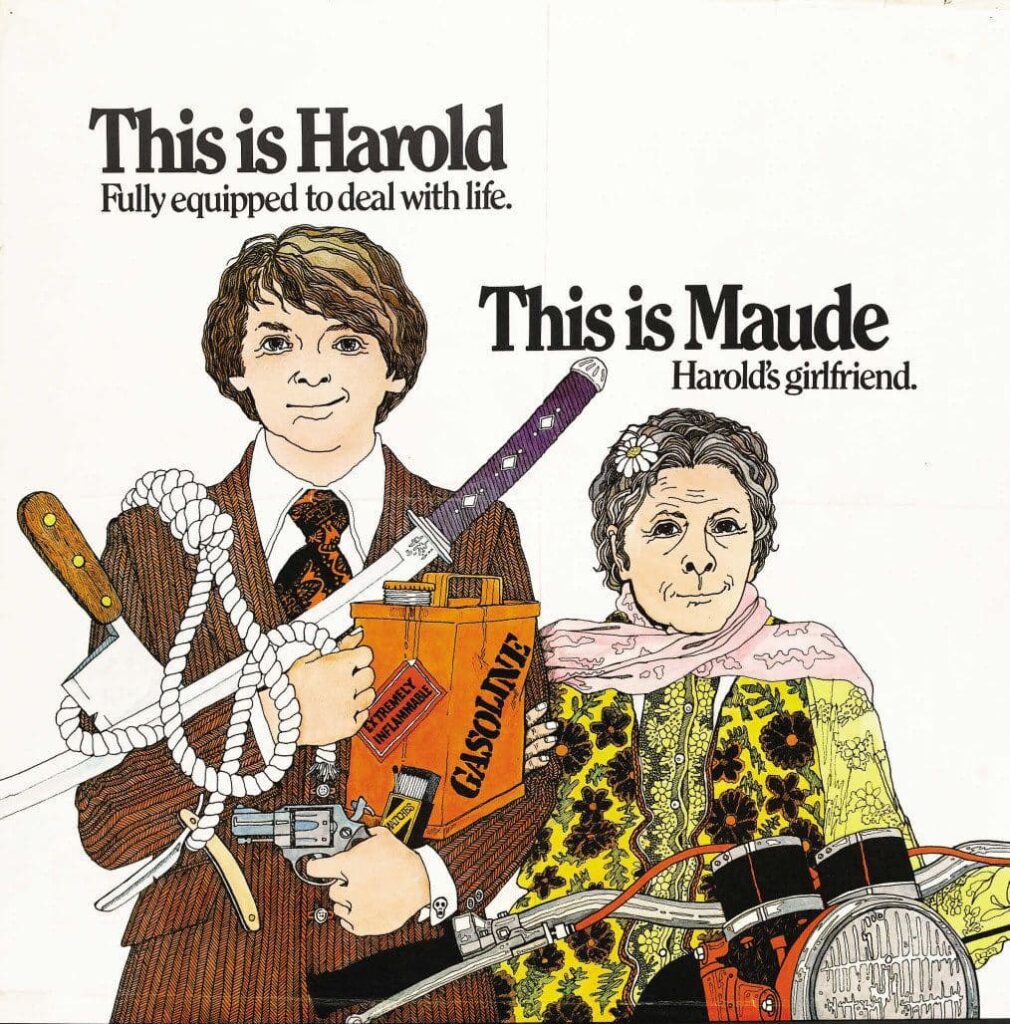
Harold and Maude is a genuinely unique, wonderfully quirky, and ultimately heartwarming dark comedy that explores themes of death, existentialism, and unconventional love. It tells the story of Harold, a morbid young man in his late teens obsessed with attending funerals and staging elaborate, theatrical suicide attempts, who finds an unexpected soulmate in Maude, a wonderfully eccentric, life-affirming octogenarian who shares his fascination with death, but from a completely different, celebratory perspective. The dark humor arises from Harold’s macabre antics—including crashing strangers’ funerals and trying to shock his mother with his “suicides”—and Maude’s quirky, joyful embrace of life’s fleeting nature, often leading them into hilarious scrapes with bewildered authority figures. This film beautifully balances its grim subject matter with a profound, almost poetic message about living life to the fullest, embracing individuality, and finding connection in the most unexpected places. It proves that even the most taboo topics can be approached with tenderness, warmth, and a healthy, life-affirming dose of dark laughter.
6. Shaun of the Dead (2004): Rom-Zom-Com with Heart and Guts
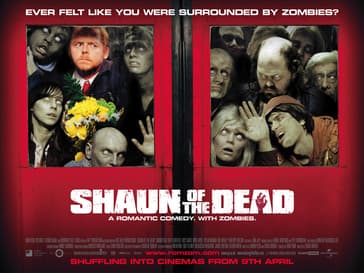
Edgar Wright’s Shaun of the Dead masterfully blends the visceral horror of a zombie apocalypse with relatable relationship drama and side-splitting, distinctly British humor. Billed ingeniously as a “rom-zom-com” (romantic zombie comedy), it follows ordinary, aimless electronics salesman Shaun (Simon Pegg) as he tries desperately to win back his exasperated girlfriend, mend his fractured relationship with his slobbish best friend, and somehow survive a sudden, unexpected zombie outbreak in London. The dark comedy stems brilliantly from the utterly mundane reactions of the characters to extraordinary horror—they’re squabbling over trivial household chores. At the same time, zombies shamble past the window or try to decide which vinyl records are expendable enough to use as weapons. It’s a sharp, clever parody of zombie movie tropes, but it also boasts a surprising amount of genuine heart, grounding the gore and gags in relatable human connection and everyday frustrations. The humor is derived from the delightful exasperation of mundane life clashing head-on with the unthinkable, proving that even the literal end of the world can be incredibly, absurdly funny.
7. Little Miss Sunshine (2006): A Family’s Unconventional Journey
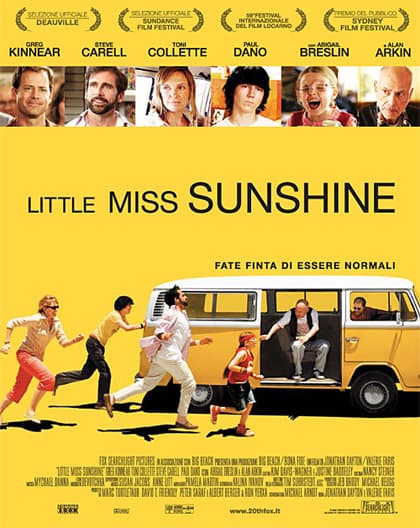
Little Miss Sunshine is a poignant yet hilariously insightful, dark comedy that centers on a profoundly dysfunctional family. They embark on a desperate, chaotic cross-country road trip in a beat-up yellow VW bus, all to get their youngest daughter, Olive, into a seemingly superficial beauty pageant. What makes this film a standout dark comedy is its unflinching willingness to tackle sensitive themes of failure, profound mental health struggles, suicide, and even death, yet it manages to infuse every difficult moment with surprising warmth and an abundance of genuine laughs. The humor stems from the stark contrast between the family’s eccentricities and their often misguided yet shared pursuit of Olive’s dream despite the mounting pile of misfortunes and tragedies. The film’s brilliance lies in its ability to find profound, genuine humor in the face of deep sadness and hopelessness, subtly suggesting that laughter is often the most vital and resilient coping mechanism available to us. It’s a heartwarming testament to the power of family, no matter how flawed, and the enduring human spirit to keep pushing forward, even when life throws its darkest, most unexpected punches.
8. Burn After Reading (2008): Espionage Gone Awry
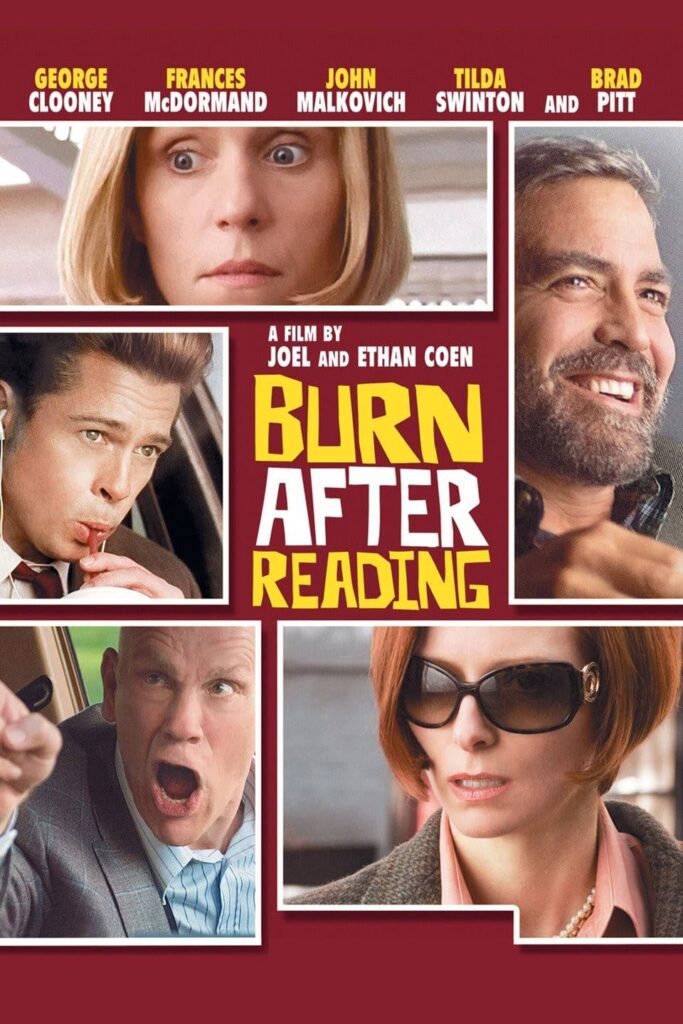
The Coen Brothers, true masters of the genre, deliver another impeccable masterclass in dark comedy with Burn After Reading, a cynical, absurd, and brilliantly plotted take on espionage, overwhelming incompetence, and accidental death. The convoluted plot revolves around a misplaced disk containing the seemingly dull memoirs of a disgraced CIA analyst (played with hilariously explosive anger by John Malkovich), which inadvertently falls into the hands of two dim-witted gym employees (a surprisingly goofy Brad Pitt and a wonderfully misguided Frances McDormand). They mistakenly believe it contains top-secret government information and decide to try and sell it. What follows is a labyrinthine series of betrayals, profound misunderstandings, and increasingly violent, yet comically absurd, mishaps. The humor is derived from the characters’ overwhelming stupidity, their wildly inflated sense of self-importance, and the bleak, nihilistic worldview where everyone is either hopelessly incompetent or casually amoral. It’s a hilarious indictment of American intelligence agencies and human folly, where even death feels less like a tragedy and more like a bureaucratic oversight.
9. Four Lions (2010): The Absurdity of Extremism
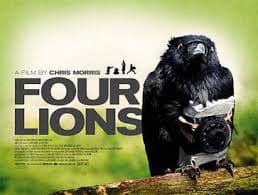
Chris Morris’s Four Lions is arguably one of the boldest and most controversial dark comedies ever made, fearlessly tackling the utterly unthinkable subject of homegrown terrorism. How do you find humor in that, you ask? The film follows a small group of inept British jihadists as they comically bungle their way through various attempts to plan and execute a terrorist attack. The humor is derived from their profound, almost childlike incompetence, their petty ideological squabbles, their deeply flawed understanding of religious doctrine, and their nearly absurdly naive grasp of the real world. It’s a daring tightrope walk of a film that manages to humanize its characters in their sheer absurdity without ever condoning their extremist views, ultimately satirizing the disturbing banality of evil. It challenges viewers to laugh at the discomforting reality of misguided extremism, forcing a confrontation with the very absurdity that underpins such dangerous ideologies. This film is undeniable proof that dark comedy can, and sometimes must, tackle even the most taboo and sensitive topics, sparking dialogue where silence often prevails.
10. Death at a Funeral (2007): A Funeral to Remember (or Forget)
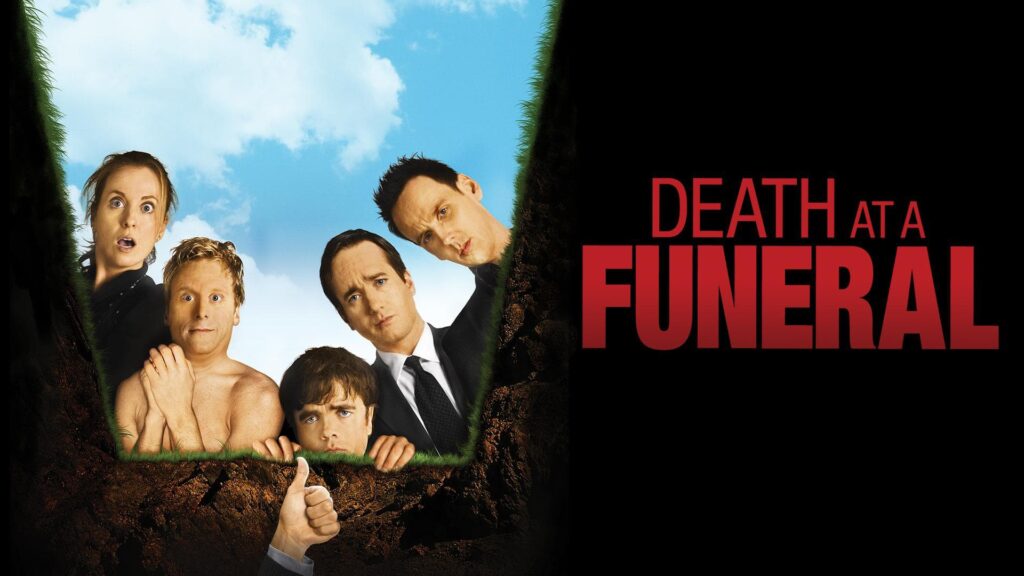
The original British version of Death at a Funeral is a brilliant farce and a quintessential dark comedy centered on a solemn occasion—a funeral—that descends into absolute, uncontrolled chaos. The film follows Daniel (Matthew Macfadyen) as he tries desperately to give his recently deceased father a respectable send-off. However, his efforts are constantly undermined by a truly dysfunctional family, a series of mistaken identities, long-held family secrets bubbling to the surface, and the wholly unexpected appearance of a blackmailing dwarf who threatens to expose the deceased’s scandalous past. The dark humor stems from the escalating absurdity of the situations—a corpse being inadvertently moved, a guest accidentally drugged with powerful hallucinogens, and various scandalous revelations that emerge at the worst possible moments—all unfolding during a solemn occasion. It’s a hilarious exploration of family dysfunction, the complex process of grief, and the ridiculous lengths people will go to maintain appearances, even when everything around them is hilariously falling apart. It perfectly captures the uncomfortable hilarity that can arise when tragedy and pure farce collide head-on.
Beyond the Punchline: The Social Commentary of Dark Comedy
Dark comedy often serves a purpose far greater than merely eliciting uncomfortable laughter; it acts as a compelling lens through which to examine and critique society’s deepest anxieties, its hypocrisies, and its pervasive flaws. By cleverly wrapping uncomfortable truths in the guise of humor, these films often deliver profound social commentary that might otherwise be too difficult or too preachy to swallow. Think about how Dr. Strangelove ingeniously satirizes the sheer absurdity of the Cold War and the terrifying logic of mutually assured destruction or how American Psycho expertly dissects the soulless materialism and moral bankruptcy of the 1980s corporate elite. Dark comedy possesses a unique ability to expose the banality of evil, the foolishness of bureaucracy, or the inherent contradictions in human nature without ever resorting to heavy-handed didacticism. It forces us to confront uncomfortable realities not by lecturing us but by subtly, perhaps even mischievously, making us laugh at them, thereby stripping them of some of their intimidating power. It’s a subtle yet remarkably effective form of critique, allowing audiences to process and reflect on serious, weighty issues while being thoroughly entertained. It challenges us to look beyond the surface, to see the deeper, often uncomfortable, truths lurking beneath the comedic facade.
The Challenge of the Dark Laugh: When Humor Misses the Mark
While dark comedy can be incredibly potent, insightful, and cathartic, it’s also a genre fraught with inherent peril. There’s a constant, extremely delicate balance between pushing boundaries and inadvertently crossing lines, and when that humor misses the mark, the results can be truly disastrous, leading to outrage rather than laughs. What, then, precisely makes a dark joke fail so spectacularly? Often, it’s a fundamental lack of nuance, a critical misjudgment of tone, or a failure to establish sufficient emotional distance or, crucially, empathy for the subject matter or its victims. If the humor feels genuinely mean-spirited, exploitative of tragedy, or dismissive of real suffering, it quickly ceases to be funny and instead becomes offensive, alienating, and even hurtful. The intent behind the joke is paramount: is it genuinely satirizing a systemic problem or a flawed perspective, or is it simply exploiting a tragedy for shock value? Audiences, too, bring their unique sensitivities, experiences, and cultural contexts to the viewing experience, meaning what one person finds cathartic and insightful, another might find deeply insensitive or even traumatizing. Navigating this treacherous landscape requires immense skill and a keen understanding of both comedic timing and human psychology —a challenge that even the most seasoned filmmakers sometimes struggle with and occasionally fail to achieve.
The Evolution of Dark Comedy in Cinema
The genre of dark comedy has a rich, fascinating, and wonderfully adaptive history in cinema, evolving significantly over the decades to reflect changing societal anxieties and comedic sensibilities. Its subtle roots can be traced back to early Hollywood films, which, in their quiet ways, subtly challenged societal norms; however, it truly came into its own in the mid-20th century. This was particularly true after World War II, as filmmakers grappled with the grim realities of global conflict, Cold War paranoia, and newfound existential dread. Films like Stanley Kubrick’s Dr. Strangelove, released in the 1960s, bravely dared to make humor out of the very real threat of global annihilation, setting an incredibly high, and often imitated, bar for the genre. The 1970s saw a rise in more cynical, counter-culture-inflectedcounter-culture-inflected dark comedies, such as Harold and Maude, which questioned societal expectations of life and death. Later, the vibrant 1990s brought a significant resurgence with directors like the Coen Brothers and Quentin Tarantino pushing boundaries even further with their distinctive, often violent, and always witty take on crime, morality, and human folly. In the 21st century, dark comedy continues to thrive and innovate, reflecting contemporary anxieties and using its unique brand of humor to explore everything from zombie apocalypses to the absurdity of political extremism. It’s a genre that constantly reinvents itself, proving its enduring power and necessity to find laughter and often profound truth in the darkest corners of human experience.
Conclusion
As we wrap up our exploration of dark comedy done right, laughing at the unthinkable, it’s abundantly clear that this unique genre holds a truly vital and irreplaceable place in the cinematic landscape. These films are much more than just entertainment; they are a profound testament to the human spirit’s remarkable ability to find light, wisdom, and even joy, even in the deepest, most terrifying shadows. They boldly dare to confront the uncomfortable, the taboo, and the truly unthinkable aspects of our existence, offering us a crucial space to process anxieties, challenge conventions, and, ultimately, find genuine catharsis through the most unexpected means: laughter. Whether it’s the existential dread of nuclear war, the mundane yet horrifying realities of crime, or the painfully relatable struggles of family dysfunction, dark comedy shines a mirror on our world, reflecting its absurdities, flaws, and hidden truths at us with a wry, knowing grin. It requires immense courage, sharp intelligence, and an incredibly delicate touch from its creators, but when executed brilliantly, the dark laugh can be the most honest, insightful, and truly memorable of all. It reminds us, perhaps more powerfully than any other genre, that sometimes, the absolute best way to deal with life’s profound difficulties, its tragedies, and its unanswerable questions is to find the humor in them.